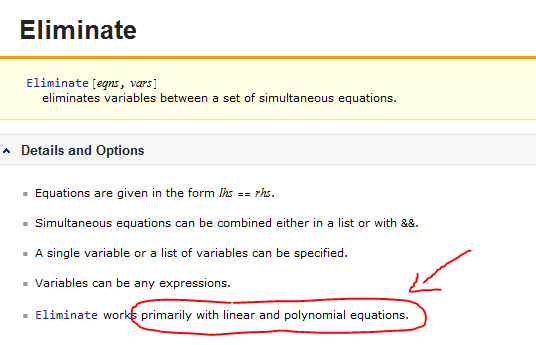As another example of Eliminating some variables in a list of differential equations and solve them for specific defined variables, I consider to have some nonlinear equations plus some linear equations.
Solve[Eliminate[{a[t] == b1 + c*x1''[t], b2 == e*(x2[t] - y[t])
+ f*(x2'[t] - y'[t]) + d*x2''[t], g*y''[t] + e*(y[t] - x2[t])
+ f*(y'[t] - x2'[t]) + m*L == 0,
n*z''[t] == m - R, a1[t] == b3 + c1*alfa1''[t],
b4 - d1*L1*Sin[alfa2[t]] - n2*x3''[t]*L1*Sin[alfa2[t]] == r1*alfa2''[t],
d1 == M1*x4''[t], b1 == b2, y[t] == z[t]/L,
y'[t] == z'[t]/L, y''[t] == z''[t]/L, x2[t] == x1[t],
x2'[t] == x1'[t], x2''[t] == x1''[t], alfa1[t] == alfa2[t],
alfa1'[t] == alfa2'[t], alfa1''[t] == alfa2''[t], x3[t] == z[t],
x3'[t] == z'[t], x3''[t] == z''[t],
x4[t] == x3[t] - L*Cos[alfa2[t]], x4'[t] == x3'[t] + L1*alfa2'[t]*Sin[alfa2[t]], x4''[t] == x3''[t] + L1*alfa2''[t]*Sin [alfa2[t]] +
L1*(alfa2'[t])^2*Cos[alfa2[t]],
b3 == b4}, {b1, b2, x2[t], x2'[t], x2''[t], y[t],
y'[t], y''[t], m, x3[t], d1, b3, b4, x3'[t],
x3''[t], alfa2[t], alfa2'[t], alfa2''[t], x4[t], x4'[t],
x4''[t]}], {x1''[t], z''[t], alfa1''[t]}]
Mathematica complains when I am including the nonlinear part
Eliminate::ifun: Inverse functions are being used by Eliminate, so some
solutions may not be found; use Reduce for complete solution information. >>
Solve::svars: Equations may not give solutions for all "solve" variables. >>
and it just give an answer of
{{x1''[t] -> -((-L a[t] + e L x1[t] - e z[t] + f L x1'[t] -
f z'[t])/((c + d) L)), z''[t] -> -((L^2 R - e L x1[t] + e z[t] -
f L x1'[t] +f z'[t])/(g + L^2 n))}}
and there is no answer for alfa1''[t], I am wondering is that because of using Sin[] and Cos[]? Is it possible for Mathematica to recognize Sin^(-1) as ArcSin in complicated equations?







